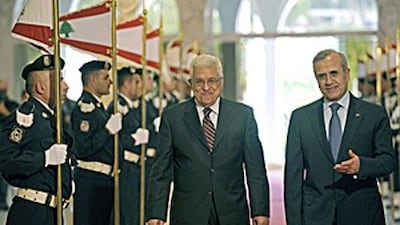BEIRUT // The Palestinian president, Mahmoud Abbas, arrived in Lebanon yesterday for a series of meetings with the new Lebanese government to discuss the status and conditions of hundreds of thousands of Palestinian refugees and their descendents housed in more than a dozen deeply impoverished refugee camps around the country. Mr Abbas used the rare visit to denounce any attempts to allow the population, which the UN estimates at nearly 400,000 people, permanent residency in Lebanon. The number is said to include those Palestinians who have emigrated abroad. Both Lebanese and Palestinian officials say the true number of people in the camps is closer to 250,000.
"Until our problem is solved, we are guests in Lebanon, and we refuse any nation other than our own and any solution other than the implementation of UN Security Council Resolution 194," on Palestinian return to their former homeland, Mr Abbas told Al-Liwaa newspaper in yesterday's edition. Lebanon has had a tense relationship with the Palestinian leadership since the early 1970s, when the Palestine Liberation Organization's presence here contributed to a 20-year civil war between Muslims and Christians.
As a result, most Lebanese oppose granting the refugees permanent residence along the lines of their status in Jordan and Syria, while the Palestinian authorities oppose any effort to do so because it could diminish support for resistance to Israel. "And because we're not Lebanese, we're Palestinian," said Abu Mohammed, 41, a resident of the Shatila camp whose parents came from northern Galilee in 1948. "This is not our home, no matter how many decades we live here."
After arriving at the presidential palace in Baabda for a meeting with the Lebanese president, Michel Suleiman, Mr Abbas denied rumours that have flooded Lebanon's camps in the past few months that an agreement had been reached to issue all refugees Lebanese passports. "The presence of Palestinians is temporary in Lebanon. We are coordinating security issues with the Lebanese government," he said.
Security issues also dogged his visit, as armed groups in the camps have been a constant source of insecurity and violence in Lebanon. An al Qa'eda-inspired group, Fatah al Islam, seized control of the northern Nahr al Bared refugee camp in May 2007, leading to a three-month siege that killed hundreds and demolished the camp. Since then, offshoots of the group are suspected of a series of bombings and assassinations around Lebanon that have led to the deaths of an MP, top military officials and UN peacekeepers in South Lebanon.
One suspected cell, thought responsible for planning attacks on the UN and firing rockets into northern Israel, was arrested last weekend in a village known for militant Islamic activity in the Beqaa Valley. Although the members of the cell are Lebanese, they are said to have close ties to the remnants of Fatah Islam. Concern about stability in the camps and along the border - and a power struggle within the Fatah-led PLO - have led to scores of officials being replaced by the Palestinian Authority in Ramallah, despite there being serious concern about the influence the PA can have over the heavily armed and historically autonomous armed factions within the camps. With a stated policy of disarming the camps, although no moves have been made to do so, many Palestinian officials fear that a move to disarm could spark a Nahr Bared-like conflict.
Just before his visit, Mr Abbas's office announced that Abdullah Abdullah, a former PLO ambassador to Germany, would replace Abbas Zaki, the PA's current envoy to Lebanon after less than a year in office, before the start of talks with the new Lebanese government. These talks are expected to include discussions on lifting legal barriers to Palestinians working in dozens of professional fields, including law and medicine, but it is uncertain if an effort to disarm the camps and factions will be included in the effort.
Last year, Mr Abbas fired the head of the PLO in Lebanon, Sultan Abu Ainin, and replaced him with Mr Zaki, a move that was seen as a power play against factions in the camps determined to remain armed resistance parties. Several military commanders with close ties to resistance groups and Syria were also sacked. One such commander expressed suspicions that a move was under way to disarm the camps, but said it would not become clear until the talks had begun.
But even without any move to disarm the camps, there is an increasing sense of hopelessness in Lebanon's camps. And with the UN committee that helps support the refugees facing huge budget shortfalls - its current funding is 17 per cent lower than needed to provide basic services, according to UN officials - life remains a grim reality for many. "We would be dreaming if we say things are going to be better than before inside the camps, just because some changes in the PLO are happening," according to Ahmed, 33, a member of the Popular Front for the Liberation of Palestine.
"Mark my words; the electricity will stay as bad as it is now; same for water, infrastructure and more." mprothero@thenational.ae

